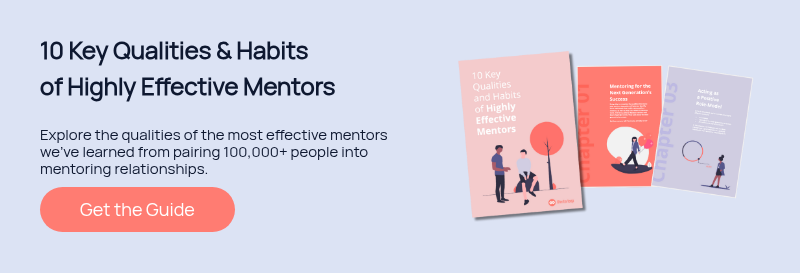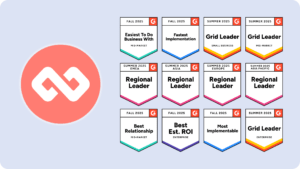We’ve helped a lot of mentors and mentees — around 55,000 to be exact — and when we ask what’s helped them the most in their mentoring journeys, we hear something a lot: knowing how to ask the right questions.
Why might that be? Because asking the right questions is a valuable tool in getting the most out of your mentoring relationships. Doing this seemingly one simple thing well can make all the difference.
Let’s look more closely at how mentoring partners can get better at asking questions.
4 Types of Questions You Should Learn How to Ask Today
According to Harvard Business Review, questioning is a uniquely powerful tool for unlocking value in organisations. That’s because it:
- Spurs learning and the exchange of ideas
- Fuels innovation and performance improvement
- Builds rapport and trust among team members
- Can mitigate business risk by uncovering unforeseen pitfalls and hazards
Therefore, it’s important that we understand the types of questions we should be asking, and how to ask them to our professional mentors and mentees.
1. Pure Inquiry
Sometimes, questions take the form of pure inquiry; they’re used to get and understand the facts. These questions should be open-ended, as you want to avoid presumptive questions. Think of these as “peeling the onion” questions. Examples of pure inquiry questions include:
- “Where would you like to start?”
- “How did the meeting go?”
- “How did that make you feel?”
- “And then what happened?”
These questions are helpful when we’re just getting to know someone, as they’re very baseline, unintrusive, and help us get a read on the respondent.
2. Diagnostic Inquiry
Diagnostic inquiry questions tend to be more focused and direct; they help you delve into the respondent’s own story about a situation, including their actions, feelings, and motives. By asking for the story about their own experience, you’ll be able to find out more about their mental process. These types of questions help steer the conversation, and can include:
- “You shared that the meeting didn’t go well, why was that?”
- “How did you come to that conclusion?”
These questions are helpful when you already know someone, and want to get to know them even better, including digging into why they do the things they do.
3. Confrontational Inquiry
Confrontational inquiry questions are helpful when you want to challenge and/or place slight pressure on someone else’s narrative. These types of questions help you introduce new ideas and hypotheses as well as tacitly give advice. Confrontational inquiry might sound something like:
- “How would you have felt, if you believed that Andy was on your side in the meeting?”
- “What would you change if you did X again?”
- “Would you have done X if you knew Y?”
This type of questioning should only be used when you know and have a good rapport with someone. But before posing such questions, ask yourself what your motivations are for asking them: are you genuinely curious, or do you feel like you have the answer and want to test if you’re right?
4. Humble Inquiry
According to Edgar H. Schein’s book, Humble Inquiry: The Gentle Art of Asking Instead of Telling, humble inquiry is “the fine art of drawing someone out, of asking questions to which you do not know the answer, of building a relationship based on curiosity and interest in the other person.” With these questions, your focus is on genuine curiosity and interest in the other party. These questions may take the form of:
- “Can you help me understand why…?”
- “What mistakes could be made when doing…?”
- “Can you think of the major risks associated with…?”
These questions are helpful when you want to take a less direct approach to nudging someone in the right direction. They can also help you establish rapport, are valuable for exploring different perspectives, and can minimise bias and preconceptions.
Being a Better Mentoring Partner
Being more intentional about the questions we ask and how we ask them can help both mentors and mentees get the most out of their mentoring sessions and relationships.
And what happens after we ask those all-important questions? It’s time to actively listen—an equally important part of the mentoring-relationship pie.
Learn more about what makes great mentors and mentees from our eBook, 10 Key Qualities and Habits of a Highly Effective Mentor (tip: it’s not just for mentors).





